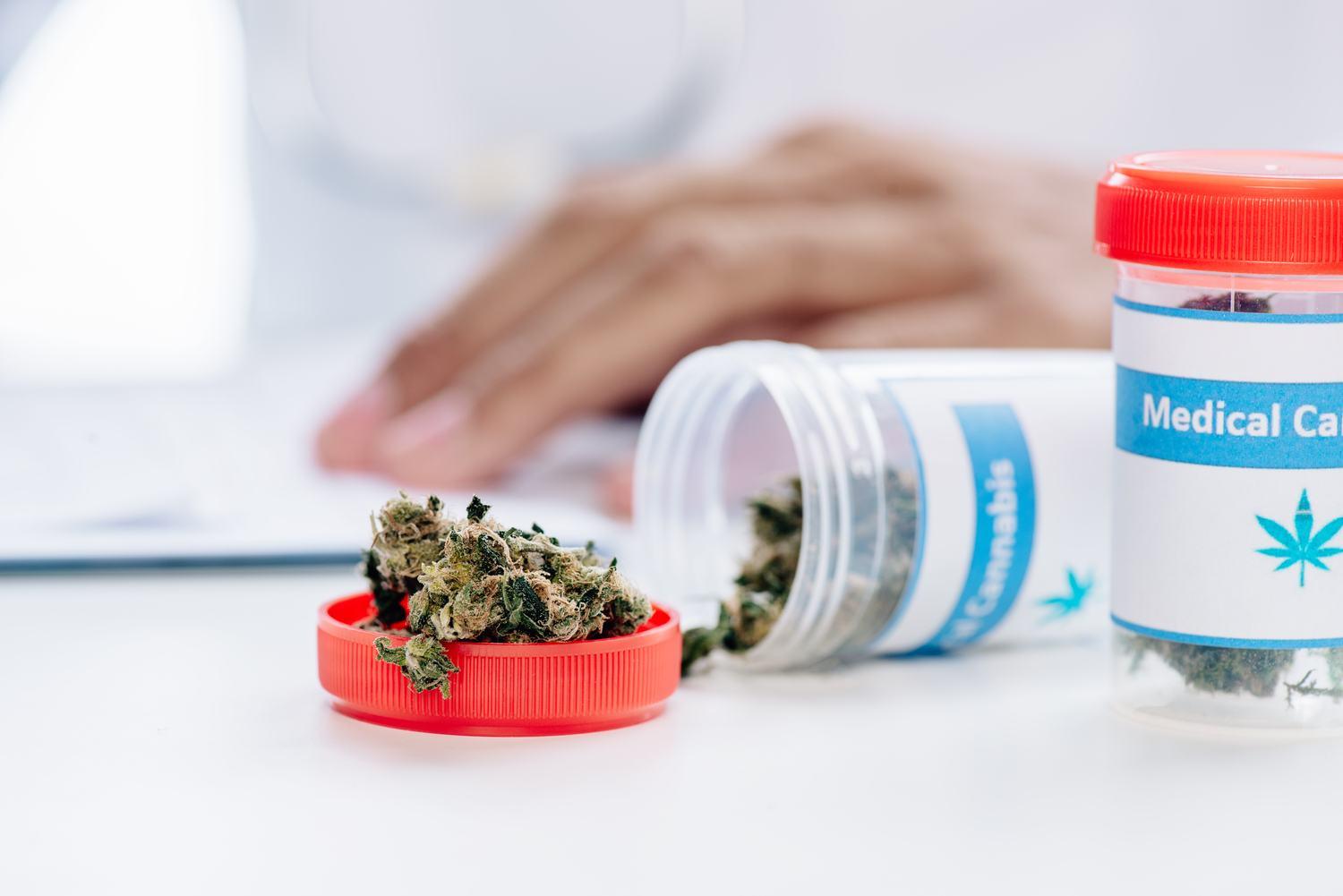Traveling With Medical Marijuana in Florida
- Jake Peter
- Published: February 14, 2024
- Fact-checked by Dr. Desiree Granados

Exploring the sun-soaked landscapes of Florida can be an exciting experience, but for those who rely on medical marijuana for their well-being, traveling within the Sunshine State requires a careful understanding of the legalities involved. Whether you’re visiting the white sandy beaches of the Gulf Coast, the enchanting theme parks of Orlando, or the vibrant streets of Miami, knowing how to legally and safely transport your medication is paramount.
In this article, we’ll cover the key points you need to consider when traveling with medical marijuana in Florida to help ensure you continue to meet your health needs without any legal trouble.
Can You Travel with Medical Marijuana in Florida?
Within State Lines
Florida law allows registered patients to carry medical marijuana while traveling within the state. Patients must have their valid Medical Marijuana Use Registry identification card at all times and should carry no more than the amount prescribed by their physician.
It’s advisable for patients to keep their medication in its original packaging and to have documentation that certifies the marijuana is for medicinal use to prevent any legal complications while traveling.
Beyond State Lines
Federal law still classifies marijuana as a Schedule I substance, which prohibits its transportation across state lines, even if you are traveling between states where medical marijuana is legal.
Furthermore, each state has its own set of regulations governing the use, possession, and transportation of medical marijuana. Before considering interstate travel with medical marijuana, you should thoroughly research the laws of the state(s) you plan to visit to ensure you remain compliant.
Can You Bring Medical Marijuana from Another State into Florida
Due to federal laws regulating controlled substances, it’s illegal to cross state lines with medical marijuana, even if you’re traveling from one state that has legalized medical cannabis to another such as Florida. Despite having a medical marijuana program, Florida does not allow the importation of cannabis products from out of state. Patients must purchase medical marijuana from a licensed dispensary within Florida to remain compliant with state law.
How Much Medical Marijuana Can You Carry in Florida?
In Florida, a qualified patient or caregiver is legally allowed to possess up to four ounces of smokable medical marijuana, as prescribed by a certified physician. Patients must ensure that their medical marijuana is carried in its original packaging from an approved medical marijuana treatment center.

Can You Consume Cannabis in Public in Florida?
In Florida, the consumption of cannabis in public remains illegal. This covers all forms of cannabis, including medical marijuana, which qualified patients are only permitted to use in private spaces. Public spaces, such as parks, beaches, and streets, are subject to this prohibition, and the state enforces legal penalties for those who do not comply.
Can You Fly with Medical Marijuanas in Florida?
While Florida has legalized the use of medical marijuana, patients considering air travel with this substance are subject to federal law, under which marijuana remains illegal. This prohibits the transportation of medical marijuana across state lines or in the United States airspace.
Therefore, even if you are a registered medical marijuana patient in Florida, it’s important to understand that flying with it under the jurisdiction of federal agencies such as the Transportation Security Administration (TSA) can result in legal consequences.
Get Your Medical Marijuana Card through the Sanctuary
The Sanctuary Wellness Institute streamlines the process of obtaining your medical marijuana card with exceptional support and guidance. We believe in the therapeutic potential of medical marijuana and are dedicated to connecting you with a certified doctor who can evaluate your qualifying condition(s) and help you decide whether medical cannabis treatment is right for you.
If your doctor recommends you for medical marijuana treatment, our staff can guide you through the process of submitting your medical marijuana card application to the state so you can procure your MMJ card and begin purchasing cannabis products as soon as possible.
Our Florida Medical Marijuana Locations
Spring Hill, FL Marijuana Doctors 10532 Spring Hill Dr, Spring Hill, FL
Lakeland, FL Marijuana Doctors 107 West Pine Street, Suite A Lakeland, FL
Port Charlotte, FL Marijuana Doctors 1100 El Jobean Rd Suite 110 Port Charlotte, FL
Sarasota, FL Marijuana Doctors 2065 Siesta Dr. Sarasota, FL
Frequently Asked Questions
Florida currently does not have a reciprocity agreement in place that enables local dispensaries to accept out-of-state medical marijuana cards. This means that individuals with MMJ cards issued from other states cannot purchase medical cannabis from Florida dispensaries.
Despite the legalization of medical marijuana in many states, cannabis remains illegal under federal law, which governs U.S. airspace. The Transportation Security Administration (TSA) is a federal agency, and their screening procedures are guided by federal law. Therefore, even if you have a valid medical marijuana prescription, it is not legal to fly with marijuana in the U.S.
If a TSA officer encounters an individual in possession of marijuana, they are required to report this to local law enforcement, irrespective of medical cards or marijuana’s legality in the state.
Airport security procedures are primarily focused on safety threats, but Transportation Security Administration (TSA) officers are obliged to report any suspected violations of law, which includes possession of marijuana and cannabis-infused products.
Therefore, while the TSA’s security screening procedures are not specifically designed to search for drugs, discovery of marijuana during routine screenings can lead to involvement of law enforcement.
The Transportation Security Administration (TSA) is primarily concerned with flight safety, not necessarily the content of your snacks. Edibles containing federally legal substances, like CBD derived from hemp, are generally permissible. However, if your edibles contain THC, which is still illegal under federal law, you could face legal repercussions if they’re discovered by the TSA.
States Where We Offer Medical Marijuana Card Services
How we reviewed this article:
- Cristina Barbee (2024). Can You Travel with Medical Marijuana
https://getfluent.com/traveling-with-medical-marijuana-what-you-need-to-know/ - Online Sunshine (2023). The 2023 Florida Statutes (including Special Session C)
http://www.leg.state.fl.us/statutes/index.cfm?App_mode=Display_Statute&URL=0300-0399/0381/Sections/0381.986.html - Surterra (2024). Traveling with Medical Marijuana
https://www.surterra.com/medical-cannabis/traveling-with-medical-marijuana - Michael O. Lawal (2024). Does Florida Accept Out-of-State Medical Cards?
https://elevate-holistics.com/blog/does-florida-accept-out-of-state-medical-cards/ - Anand Dugar (2023). Traveling with Weed: Can You Fly With Medical Marijuana in 2024?
https://greenhealthdocs.com/can-you-fly-with-medical-marijuana/ - Addy Bink (2023). Can TSA stop you for marijuana in your luggage?
https://thehill.com/homenews/nexstar_media_wire/4356610-can-tsa-stop-you-for-marijuana-in-your-luggage/ - Tony Abou Jaoude (2024). Can You Bring Edibles on a Plane?
https://www.happyvalley.org/resources/can-you-bring-edibles-on-a-plan
Current Version
February 14, 2024
Written By
Jake Peter
Fact-checked By
Dr. Desiree Granados
Editorial Process
Our Editorial Process

Jake Peter received his journalism degree from Emerson College and has been writing content for the Sanctuary Wellness Institute since 2021. He is passionate about all things cannabis.







